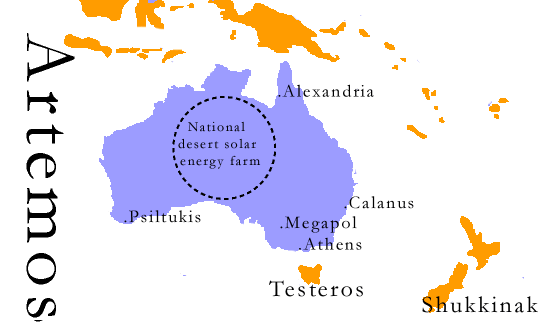| The story of Artemos was contructed on 5th September 1997 by the "Off the Beaten Track" workshop, held in the Riddoch Art Gallery, Mt Gambier. |
 |
During Alexander the Great's conquest of Phoenicia, he discovers a secret trading route to a southern continent. He assumes this to be the lost continent of Atlantis. As a champion of Greek philosophy, he is determined to send a party of his finest explorers to this mysterious land. After many adventures, the Greek explorers finally discover this continent and take control of the Phoenician trading ports. Their initial hopes of discovering Atlantis are dashed, but in the meantime, the Alexandrian empire is dissolving. Rome is emerging as the new ruler of the Meditteranean and Greek refugees seek sanctuary in this distant land.
Battle of the sexes
Initially, the Greek settlement proceeds calmly. The population enjoys the freedom to pursue cultural life unhindered by rival empires. Greeks and local Aborigines exchange gods. A dense new cultural fabric is woven.
The settlement is torn apart, however, when a battle of the sexes erupts over the ownership of philosophical ideas. A new arrogant generation of male philosophers demand knowledge of the women's mystery cult, held in a sacred cave. Their intention is to replace this female business with their own subterranean ritual, based on an enactment of Plato's myth of the cave. The women revolt and a battle erupts on the scale of a civil war. As the men's strength had weakened with too much intellectual labour, they were eventually defeated. Rather than remain the vanquished gender, they left as one to seek new life for themselves in the island to the southeast of the continent.
Testeros is founded
They called this island Testeros and pursued their business unhindered by female distractions. It is during this period that they institute the famous Code of Logos in which the mind made the official currency. According to finely detailed rates of exchange, a well-crafted argument, wild inspiration, or poetic metaphor may be used to purchase practical items such as food and labour. The men of Testeros believe themselves to be the pioneers of a future Atlantis.
The chaste age
Meanwhile, the women name their continent Artemos and take advantage of the men's absence to adopt more outgoing ways. Their clothing abandoned the modesty necessitated by the male gaze. They could expose their breasts without shame. Special sports were developed to cultivate their strengths in practical tasks.
 While the women of
Artemos had retained some male prisoners for purposes of reproduction, the men of Testeros
denied the instinct of generation entirely. Unofficially, though, many took concubines
from the local Aboriginal population. A new generation of half-Greek, half-Aborigine began
to emerge, while their fathers became evermore otherworldly in their spiritual practices.
While the women of
Artemos had retained some male prisoners for purposes of reproduction, the men of Testeros
denied the instinct of generation entirely. Unofficially, though, many took concubines
from the local Aboriginal population. A new generation of half-Greek, half-Aborigine began
to emerge, while their fathers became evermore otherworldly in their spiritual practices.
To the rescue
In the late 18th century, a fleet of Spanish missionaries arrived on the shores of Artemos to convert the "natives". The women were first quite receptive to the new religion of male sacrifice, but were disappointed to find some of these fine sailors more interested in their bodies than their minds. Fearly wholesale rape, they called upon their departed males for assistance. The new breed from Testeros decided to assist, mostly to escape the increasingly decadent ways of their fathers. A fierce battle ensured as Greek men and women fought side by side against the Spanish demons. Their victory was marked by a special ceremony in their capital, Megapol, in which the ancient custom of Olympic games was revived in all its splendour among the extinct volcanoes of this ancient land.
Megapol
Today, Megapol accommodates a population of five millions. The number is boosted every four years as athletes come from all around the world to partake in the Olympic contest.
On the north-east coast of Artemos is a famous library city that contains the works transported by the original settlers. After the sack of Alexandria in Egypt, this library contains the only existing copies of Aristotle's complete works. During the course of its development, it also becomes a major library for classics of South-East Asian mythology. Researchers come from all around the world to study the only transcriptions of long oral epic poems.
